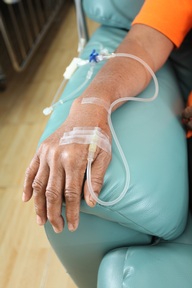Charity warns of cancer crisis of 'unmanageable proportions'
There will be 2.5 million people living with cancer in the UK in 2015 according to research conducted by Macmillan Cancer Support. The research shows an increase of nearly half a million people within the previous five years.

Macmillan Cancer Support highlighted the added pressure that an increase in the number of people living with cancer could put on the NHS. In the charities 2013 report ‘Throwing light on the consequences of cancer and its treatment’ published by the charity, it was revealed that 25 per cent of the people living in the UK have a disability or health problems as a result of cancer treatment.
Chief executive of Macmillan Cancer Support, Lynda Thomas, said: “While it is great news that more people are surviving cancer or living longer with it, progress is a double edged sword. As numbers surge, the NHS will soon be unable to cope with the huge increase in demand for health services and the support that organisations like Macmillan provide will become even more urgent and important.
“But we cannot do it alone. As we are threatened by a cancer crisis of unmanageable proportions, all political parties must step up and make a real commitment to supporting people with cancer.
“At this point it is no longer enough to just pay lip service to the issue. Ahead of the next general election all political parties must prioritise cancer care in their upcoming manifestos. It is essential that every one of those 2.5 million people receives the highest quality care and support and gets the best chance they possibly can of surviving cancer.”
The increase in the number of people living with cancer is as a result of an increase in the ageing population, as well as improvements to the methods used to detect cancer and survival.
Of the 2.5 million people living with cancer, more than 60 per cent of those were diagnosed as long as five years ago, and 66 per cent of the 2.5 million people are aged over 65. In addition, the number of those living with cancer aged over 65 has increased by nearly 25 per cent since 2010.
In the charity’s 2013 report, it was estimated that there were 500,000 people living with the physical or mental consequences of cancer and its treatment which affect their lives on a regular basis.

John Pearson, who was diagnosed with bowel cancer in 2006 spoke about the effects of his cancer treatment, he said: “Eight years on from my diagnosis I’m still suffering fatigue and permanent nerve damage to my legs, hips and arms from the chemotherapy.
“I try to stay positive as I’ve survived cancer but I’m living with the long term side effects of treatment. I wish I could do without the health services but I can’t – I see my GP for help with pain control, and have to visit the hospital for colonoscopies, neurology, and physiotherapy.”
The number of cases of prostate cancer in men has increased by 27 per cent over the last five years and despite many survivors being in good health after treatment, some could experience ongoing health issues.
Further research has revealed that of the men who survive prostate cancer and go on to live for five or more years, they have a 60 per cent risk of urinary problems and incontinence. In addition, figures show the number of women with breast cancer to have risen by more than 20 per cent within five years.
The charity revealed that thousands of cancer patients in the UK receive little compassion and receive diagnosis too late. Macmillan Cancer Support has recognised the need for the health system to acknowledge the increasing number of people being diagnosed with and surviving cancer.
Macmillan has recently launched a new support service of people affected by thyroid cancer. Geraldine Hamilton is a nurse specialising in thyroid cancer with years of experience working in palliative care and as an oncology nurse.
Ms Hamilton will working on the charity’s support phone line to provide information and advice to people in the UK with and beyond thyroid cancer and their families and friends. Thyroid cancer affects more than 2,500 people each year in the UK, in 2011 Cancer Research UK reported Thyroid cancer as the twentieth most common cancer, making it one of the more rare forms of cancer. Survival rates for thyroid cancer are high, at 92 per cent and of those 89 per cent of people go on to live for five or more years but may go on to have regular check-ups and additional treatments.
Ms Hamilton said: “Thyroid cancer is a relatively rare cancer, compared to other forms of the disease, so those diagnosed often don’t get the information and support they badly need. It is really important that people affected by thyroid cancer get accurate information about the effects of treatment, as well as coping with life after they have been treated and even after they’ve been given the all-clear. I am thrilled to have started a vital role that is new for both me and Macmillan Cancer Support.”
Macmillan Cancer Support is calling on all political parties to commit to produce the highest and best cancer survival rates in Europe by investing in after care, reducing the number of late diagnoses and offering support to older people. Furthermore, the charity wants to see improvements to end of life care for people living with cancer, including offering free social care to ensure that cancer patients are treated with dignity and respect.
Latest News
 29-Jul-24
Dementia Bus gives carehome.co.uk staff insight into life with dementia
29-Jul-24
Dementia Bus gives carehome.co.uk staff insight into life with dementia
 01-Mar-24
Find out the top care homes in 2024
01-Mar-24
Find out the top care homes in 2024
 21-Mar-23
UK's top care homes in 2023 revealed
21-Mar-23
UK's top care homes in 2023 revealed
 03-Jan-23
carehome.co.uk launches free care helpline
03-Jan-23
carehome.co.uk launches free care helpline
 13-Dec-22
5 mins with Emily Whitehurst, chief operating officer for Constantia Healthcare
13-Dec-22
5 mins with Emily Whitehurst, chief operating officer for Constantia Healthcare